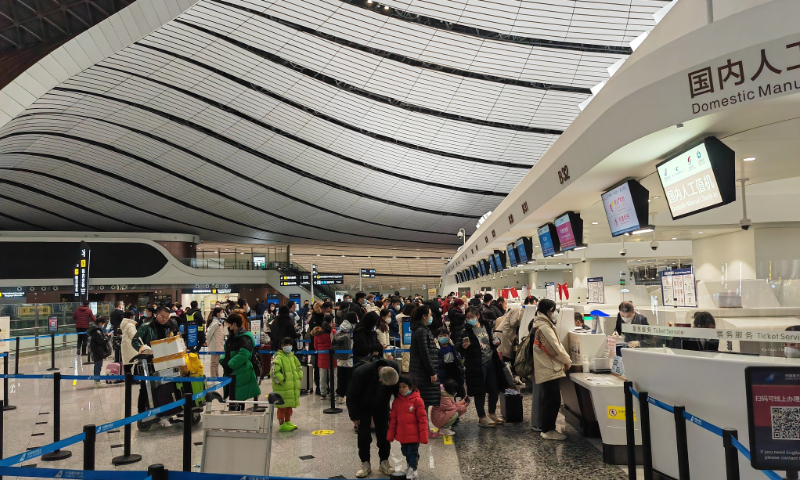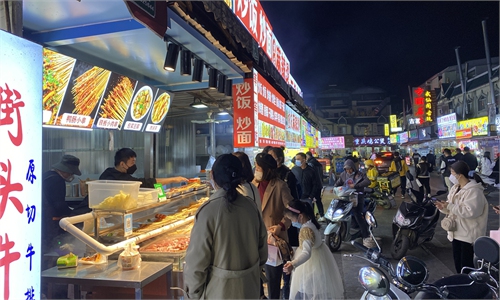
Passengers line to check in at Beijing Daxing International Airport on January 11, 2023. Photo: VCG
According to virus gene data offered by China's National Health Commission (NHC), the current strains in China have the same gene sequence as virus variants in other countries, confirming that there are no new variants in China, Wu Xi, a senior official from China's foreign Ministry told a press conference on Friday.
Wu's remarks refuted the hype in some Western media reports about the risk of new variants emerging in China. She also noted that since the outbreak of the pandemic, with the attitude of openness, transparency and responsibility, China has shared information and data with the international community and it also shared the gene information of the virus obtained during China's recent infections.
China has also maintained close cooperation with the World Health Organization. "We have had more than 60 technical communications with the WHO and five this month alone," said Wu.
According to information from the WHO on January 4, data offered by the NHC showed the main strains in China are consistent with the gene sequence of viruses tested from Chinese tourists and offered by other countries. No new variant or mutation was found.
Wu said that the official from the WHO also said in recent days that China kept sharing information on virus gene sequences with the international community.
Wu also noted that the minister of health of Singapore said on January 9 that the number of COVID-19 positive Chinese tourists who arrived in Singapore only accounted for five percent of imported cases, far less than confirmed cases from other countries.
This also proves that some countries' accusations about China are groundless and not scientific, said Wu.
FM spokesperson Wang Wenbin also refuted recent hyping by the US State Department over so-called concerns about China's sharing of epidemic data and said China has shared data and information responsibly with the international community.
Data from the US disease control center show that the new variant XBB.1.5 is spreading quickly in the US and has caused more than 40.5 percent of infections. The WHO also said the new variant is the most infectious variant of Omicron, said Wang.
The US should share epidemic information with the WHO and the international community in a timely, open and transparent way to actively respond to the concerns, said Wang.
In responding to questions on an estimate for an increase in inbound tourists after the optimization of the COVID-19 management policy, Wu told the Global Times people who want to come to China should make proper plans in accordance with the epidemic situation and ensure safety and health.
Wu also suggested that tourists familiarize themselves with the policy of the destination country and avoid problems.
Recently, some countries have imposed discriminatory measures on Chinese tourists. Wu told the press conference that such moves that disregard science and truth are unacceptable and China's reciprocal measures aim to protect Chinese citizens' legitimate interests and the normal personnel exchanges among countries.
China has suspended issuing short-term visas for South Korean citizens to travel to China for a visit, business, tourism, medical treatment, transit or other personal affairs, with the new adjustment taking effect starting Tuesday, the Chinese Embassy in South Korea said in a statement released on Tuesday.
Such measures are considered to be China's direct and reasonable response to protect its own legitimate interests, particularly after some countries hyped up China's epidemic situation by imposing travel restrictions for political reasons even though many public health experts around the globe have criticized the move.
China has actively supported and expanded personnel exchanges and will continue to offer convenience to people in business and trade to come to China. "We understand the proper prevention measures of each country, but oppose discriminatory policies or politicizing the epidemic," said Wu.



